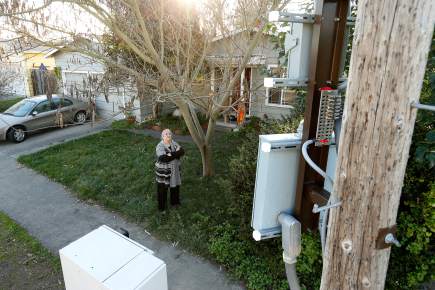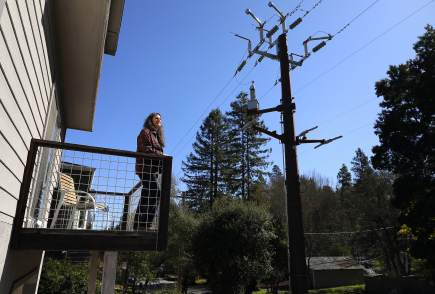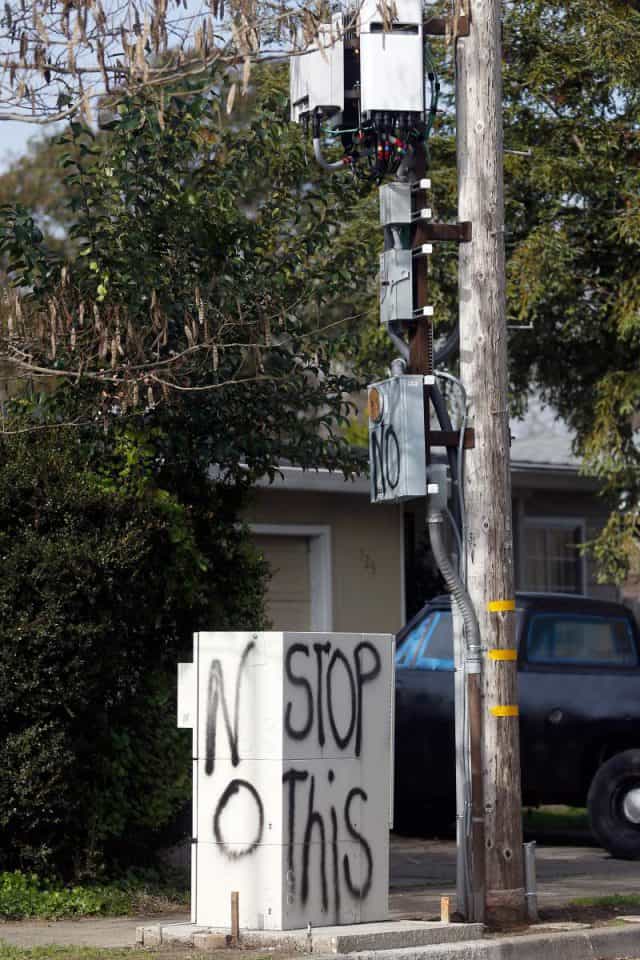
Judith Monroy looks up at a recently installed Verizon small cell signal booster (upper right) placed a few dozen feet from her front door. It was accompanied by a 5-foot high utility cabinet (lower left) containing backup batteries to power Verizon’s equipment for up to four hours in the event of a blackout. (Image courtesy: The Press Democrat)
A preview of the possible aesthetics battle of future 5G small cells that are expected to proliferate across America’s cities and towns in the coming years is taking place in Santa Rosa, Calif., where residents and some city officials reacted with surprise when Verizon began attaching “small cell” wireless repeater equipment on 72 city-owned light and utility-owned poles around the city. While not exactly the same at the 5G equipment Verizon is preparing to install in Sacramento to launch its forthcoming fixed wireless service, the similar-sized equipment turned out to look nothing like what was promised by Verizon officials. But city officials learned this only after the project was approved by a 7-0 City Council vote in 2017.
In January, one resident learned about the sudden arrival of Verizon Wireless’ equipment when she opened her front door one morning to confront a utility pole decorated with antenna equipment and a 5-foot high utility box about 30 feet away from her home.
“I’m planning to put this house on the market and the mechanisms on the telephone pole and in the ground are very aggressive and ominous-looking,” said Judith Monroy, 75. “You can’t miss them.”
Within days, someone vandalized the utility box, spray painting the word “no” and “stop this” for all to see.
In many areas, 5G small cells will be installed on utility or light poles in the front yards of residential homes. Wireless companies will want to place equipment on poles that are not obstructed by foliage or tall, nearby infrastructure, which can block signals. Requests for aggressive tree trimming to remove obstacles, within the limits permitted by local ordinances and the policies of the pole owner, are also likely. This is certain to create controversy if property owners find their trees or shrubbery removed or aggressively pruned. But for many others, the appearance of the new equipment is enough to provoke protests.
When some property owners discovered Verizon was also adorning electric utility poles with its cellular equipment, some started referring to them as “PG&E’s Godzilla Poles.”

‘PG&E Pole Godzilla’ (Image courtesy: The Press Democrat)
The utility poles hosting Verizon’s equipment have new “branches” attached several feet below pre-existing utility wiring, onto which small cell antennas are attached.
As more equipment gets installed, the more concerned citizens are phoning up city hall to complain.
Last week, city officials bowed to citizen pressure and temporarily suspended Verizon Wireless’ antenna upgrade program. While some residents cited health and safety fears from electromagnetic radiation — a fear repeatedly debunked — many more were upset by the aesthetics of the equipment and wondered if the city got a raw deal.
“I think it is time to push the pause button on this installation in our neighborhoods,” said John Cushman, a resident of Hidden Valley. “This project has been rushed and the only urgency I can see is financial.”
Verizon is paying the city $350 per pole, an amount some local residents consider absurdly low. As opposition mounted, some uncomfortable members of City Council that originally voted in favor of Verizon’s plan changed their minds, according to The Press Democrat:
Neighbors are not happy about Verizon’s new equipment. (Image courtesy: The Press Democrat)
“I am supportive of putting the brakes on this,” Councilman Tom Schwedhelm said. “I’m not convinced that we’ve done everything that we can so we can look anyone in the face and say ‘Yes it’s safe there. It’s safe to be in front of my house.’ ”
Councilman Jack Tibbetts said he viewed the rollout as a “commercial enterprise” that perhaps was better suited to commercial areas given the city’s stated goal of helping strengthen the city’s wireless infrastructure to foster entrepreneurialism.
“I’d like to see residential zones be carved out in our ordinance,” Tibbetts said to loud applause in a chamber full of people wearing bright yellow stickers reading “Caution: Cell tower microwave frequency hazard.”
But Verizon may have positioned itself to move forward regardless of what the city has in mind.
The company announced it would continue installation at 25 previously approved sites where it already has permits in-hand. Verizon has yet to obtain permits to place equipment at two other PG&E sites and 31 city light poles.
The city will not have much say over pole attachments on PG&E’s infrastructure, which is governed on the state level by the California Public Utilities Commission.
If the city denies Verizon’s request to install its equipment on city-owned light poles, the company could just move those antennas to other PG&E poles nearby instead.


 Subscribe
Subscribe

Anyone who thinks that this 5G is going to be the savior for wireless doesn’t get it: you still need a lot of fiber to connect these antennas. There’s also the problems that these are point-to-point systems meaning there cannot be ANY kind of obstruction. Wireless is not a replacement for wireline.
That is not a fair rational at all. Fiber can be run by backbone only companies. It will take time yes, but if the wireless companies are willing to do it correctly they most defiantly can replace wireline for some Americans. The key will be caps and doing it right. Just as cell phones replaced landlines, 5G can replace wired internet. Remember a HUGE swath of America is under-served so if 5G can get some federal dollars it can and will overtake wireleines in some areas.
they did a pole in front my house they did hole and place it but not cement was place on the side walk now what who do I call they need to come back and fill up with cement or something . please 8851 blue grass rd 19152 hello we need it when it rains it gets mud all over .. thank